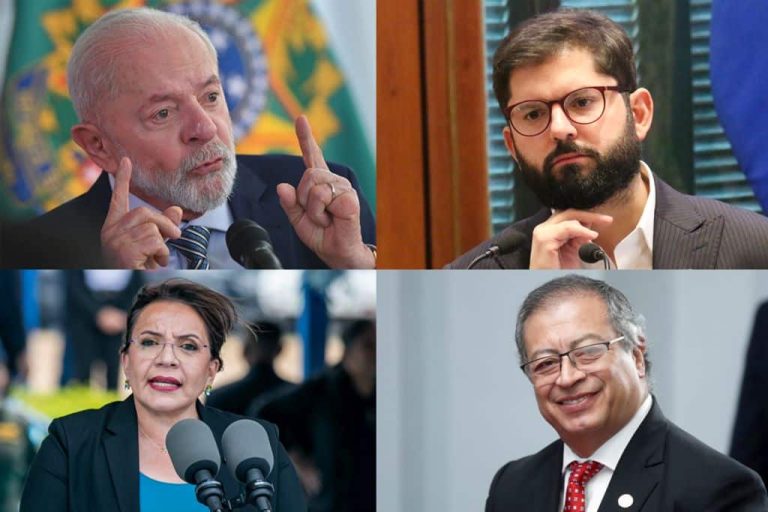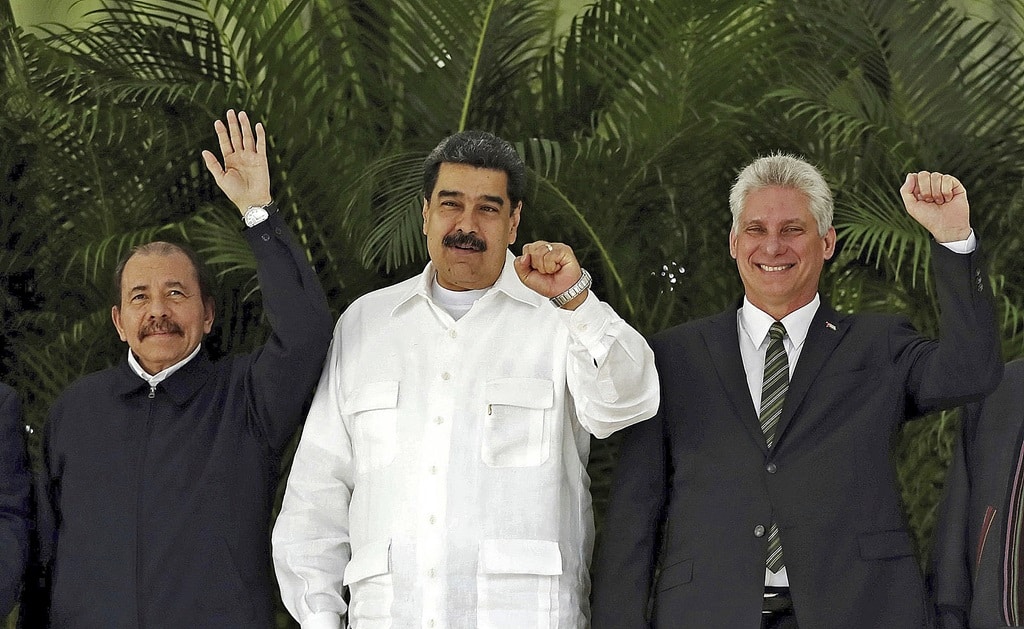27 de julio 2024

Children of Exile: The Births “Sowing Hope” in the Camp of Nicaraguan Farmers

PUBLICIDAD 1M
PUBLICIDAD 4D
PUBLICIDAD 5D
Lula da Silva, Gustavo Petro and Gabriel Boric express their concern about the direction and policies implemented by the Venezuelan government

A Combo of File Photos Featuring Brazilian President Luiz Inacio Lula da Silva (top-left); Chilean President Gabriel Boric (top-right); Honduran President Xiomara Castro; and Colombian President Gustavo Petro. Photo: EFE
On the eve of Sunday’s elections, Venezuelan President Nicolás Maduro has received a series of warnings from prominent Latin American leftist leaders, including Brazil’s Luiz Inacio Lula da Silva, Colombia’s Gustavo Petro, Chile’s Gabriel Boric, and Honduras’ Xiomara Castro. In contrast, Bolivia’s Luis Arce has shown a more lukewarm stance, while Cuba’s Miguel Díaz-Canel and Nicaragua’s Daniel Ortega have offered their full support.
Maduro, for his part, described these elections as a decisive moment for Venezuela, where the choice is between “war or peace, democracy or fascism.” During his campaign, he emphasized that the country’s future for the next 50 years depends on these elections.
“On July 28, if you don’t want Venezuela to fall into a bloodbath, into a fratricidal civil war caused by fascists, let’s guarantee the greatest success, the greatest victory in the electoral history of our people,” proclaimed the Maduro on July 17 during an campaign rally in Caracas.
However, the Venezuelan president received criticism from various sectors of the Latin American left, reflecting a shared concern about the direction and policies implemented by his government.
Brazilian President Lula da Silva expressed his concern about Venezuelan President Nicolas Maduro’s statements regarding the possibility of violence if he loses the presidential elections on July 28, 2024.
Lula called such statements dangerous and unacceptable, emphasizing that “democratic processes require that those who lose the elections accept the results peacefully.” He insisted on the need for international observers to ensure the transparency of the electoral process.
“I was alarmed by Maduro’s statements that if he loses the elections there will be a bloodbath,” said Lula. “Those who lose elections take a bath of votes, not blood,” affirmed Lula, adding that “Maduro must learn: when you win, you stay; when you lose, you leave.”
This stance represents a change in Lula’s attitude towards Maduro, as he had historically been more cautious in his criticisms.
Chilean President Gabriel Boric backed Lula’s statements: “Under no circumstances can threats of bloodbaths be made. What presidents and candidates receive are baths of votes, and those baths of votes represent popular sovereignty, which must be respected,” he emphasized.
Boric’s government also expressed concerns about the conditions for free and fair elections in Venezuela. Chilean Foreign Minister Alberto van Klaveren stated that the current conditions for a free election are not being met, highlighting the importance of democratic principles and human rights in electoral processes.
Amid international scrutiny over the electoral process and concerns about disenfranchisement of voters, especially among Venezuelans abroad, Van Klaveren emphasized the need for the international community to facilitate democratic conditions in Venezuela.
Meanwhile, Colombian President Gustavo Petro criticized the disqualification of María Corina Machado as a candidate for the presidency of Venezuela, a measure he called an “anti-democratic coup.”
Petro expressed his concern about the impact on political rights, drawing a parallel with his own experience of disqualification when he was mayor of Bogotá. He warned that administrative sanctions, such as the one applied to Machado, are a violation of political rights and emphasized the importance of protecting these rights in their entirety, both in Venezuela and Colombia.
“The right to vote is not only individual. It belongs to society, and today this discussion is very evident in the events in Venezuela with Maria Corina (Machado) and others previously: they were disqualified from participating in electoral campaigns by administrative authorities,” he stated.
Meanwhile, Honduran President Xiomara Castro expressed her support for the presidential elections in Venezuela by sending an observation mission to ensure that the process is “free, fair, independent, and transparent.”
In a similar tone of moderation regarding the situation in Venezuela, Bolivian President Luis Arce also showed his support for Nicolas Maduro and the Venezuelan electoral process, emphasizing the importance of the self-determination of Latin American peoples and rejecting foreign intervention.
“We support the right of the Venezuelan people to decide their future without external interference. The elections on July 28 are an opportunity to reaffirm their sovereignty and move towards stability.” He also emphasized the need for the elections to take place in an environment of peace and respect.

De izq. a der.: Daniel Ortega, Nicolás Maduro y Miguel Díaz-Canel, dictadores de Nicaragua, Venezuela y Cuba, respectivamente. Foto: EFE
Miguel Díaz-Canel, President of Cuba, expressed his full support for Nicolas Maduro and the Bolivarian Revolution, emphasizing the historic friendship and joint struggle between Cuba and Venezuela.
“We feel… that this is also a special occasion to express the full support and unwavering solidarity of our people, State, and Government for the Bolivarian and Chavista Revolution, the civic-military union of its people, and the leadership of President Nicolas Maduro,” he proclaimed.
In the same vein, Daniel Ortega offered his support to Nicolas Maduro and criticized foreign interference in Venezuela’s internal affairs, labeling them as destabilization attempts.
“Maduro has demonstrated exemplary courage and resilience in the face of external aggressions. The July 28 elections are a crucial step for Venezuela’s sovereignty and must be respected by the international community,” Ortega concluded.
This article was published in Spanish in Confidencial and translated by Havana Times. To get the most relevant news from our English coverage delivered straight to your inbox, subscribe to The Dispatch.
PUBLICIDAD 3M
Agencia de noticias internacional con sede en Madrid, España. Fundada en Burgos durante la guerra civil española en enero de 1939.
PUBLICIDAD 3D